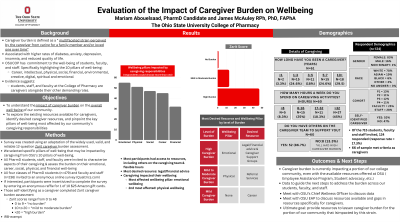Administrative Services
(161) Evaluating the impact of caregiver burden on the wellbeing of pharmacy students, faculty, and staff


James W. McAuley, RPh, PhD, FAPhA (he/him/his)
Professor and Associate Dean
The Ohio State University
Columbus, Ohio, United States
Mariam Abouelsaad, BS, PharmD (she/her/hers)
Fellow
Purdue University , United States
Primary Author(s)
Co-Author(s)
Objective : Caregiver burden is a term used to quantify the physical and psychological effects of being an informal caregiver and is associated with negative impacts on wellbeing. Caregivers have higher incidences of anxiety, depression, insomnia, and mental/behavioral disorders. Anecdotal evidence suggests that students, staff, and faculty at our College of Pharmacy are caregivers alongside their other demanding responsibilities. Our aim was to understand the impact of caregiver burden on overall wellbeing. We explored the resources available, identified desired caregiver resources, and pinpointed key pillars of wellbeing most affected by our constituent’s caregiving responsibilities.
Methods: Our survey included the Zarit caregiver burden assessment and characterized aspects of caregiving and assessed the burden on the emotional, career, social, physical, and financial wellbeing of our stakeholders. PharmD students (n=479) and faculty & staff (n=236) were invited to complete the anonymous survey.
Results: Of the 715 invited to complete the survey, 124 responded (response rate=17.3%). In our diverse sample, 53% characterized themselves as meeting the caregiver definition. According to their Zarit scores, the largest portion (77%) were carrying a high caregiver burden. Many reported caregiving for >32 hours a week and most had been caregiving for 10+ years. Most stated they had access to resources, including others on their caregiving team, and access to flexible work hours. The most desired resource was legal or financial advice. All stated that caregiving impacted their wellbeing with emotional wellbeing affected the most, followed closely by physical wellbeing.
Conclusions: Our results show caregiver burden is impacting a portion of our college community. Data from this project will guide the next steps to help address this burden across our students, faculty, and staff.
Methods: Our survey included the Zarit caregiver burden assessment and characterized aspects of caregiving and assessed the burden on the emotional, career, social, physical, and financial wellbeing of our stakeholders. PharmD students (n=479) and faculty & staff (n=236) were invited to complete the anonymous survey.
Results: Of the 715 invited to complete the survey, 124 responded (response rate=17.3%). In our diverse sample, 53% characterized themselves as meeting the caregiver definition. According to their Zarit scores, the largest portion (77%) were carrying a high caregiver burden. Many reported caregiving for >32 hours a week and most had been caregiving for 10+ years. Most stated they had access to resources, including others on their caregiving team, and access to flexible work hours. The most desired resource was legal or financial advice. All stated that caregiving impacted their wellbeing with emotional wellbeing affected the most, followed closely by physical wellbeing.
Conclusions: Our results show caregiver burden is impacting a portion of our college community. Data from this project will guide the next steps to help address this burden across our students, faculty, and staff.

.png)